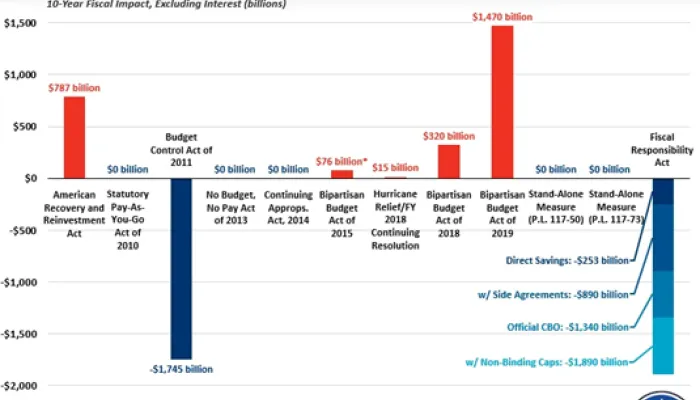Strengthening Administrative PAYGO Act Would Encourage Fiscal Responsibility
House Budget Committee Chairman Jodey Arrington (R-TX) and Representative Jack Bergman (R-MI) introduced the Strengthening Administrative PAYGO (SAP) Act of 2024 last week, along with all other majority members of the Budget Committee. The legislation is designed to strengthen Administrative PAYGO, a rule meant to prevent executive actions from adding to the deficit.
As part of the Fiscal Responsibility Act, the executive branch is required to offset any administrative actions that increase deficits with a significant fiscal impact. Unfortunately, the administration has used waiver authority designed to ensure “essential services” and “effective program delivery” to avoid abiding by the Administrative PAYGO law.
We estimate the Administration has increased ten-year deficits by at least $480 billion from actions finalized after Administrative PAYGO was supposedly in effect and has proposed several hundred billion dollars more in rules that have not yet been finalized.
The Strengthening Administrative PAYGO Act would permanently extend and clarify the Administrative PAYGO provisions enacted in the Fiscal Responsibility Act, require the Office of Management and Budget to submit estimates of the budget impact of relevant executive actions to the Congressional Budget Committees and improve transparency by requiring the Administration to document waivers in the President’s budget each year.
The following is a statement from Maya MacGuineas, president of the Committee for a Responsible Federal Budget:
We shouldn’t be adding hundreds of billions of dollars to the national debt, and the President most certainly shouldn’t be doing so unilaterally. Trying to do legislative end runs around Congress is not how the process is meant to operate; using the national credit card makes it far more egregious.
Impressively, last year Congress and the White House acted in a bipartisan manner to reduce the debt – an effort they should now build on. The President should not now be working in the opposite direction.
Administrative actions are required to be paid for under the law, but the White House has used waivers to circumvent this requirement. The SAP Act would strengthen Administrative PAYGO by compelling the Administration to submit estimates of budgetary effects to Congress and document the waivers in the President’s budget while making Administrative PAYGO statutorily permanent. The SAP Act could prevent trillions of dollars of future borrowing.
While the SAP would do more to hold the President accountable, Congress should also do more to put its own house in order – restoring the House PAYGO rule, strengthening PAYGO enforcement, extending discretionary caps, enacting a concurrent budget resolution, and working to enact meaningful deficit reduction.
###
For more information, please contact Matt Klucher, Assistant Director for Media Relations, at klucher@crfb.org.


